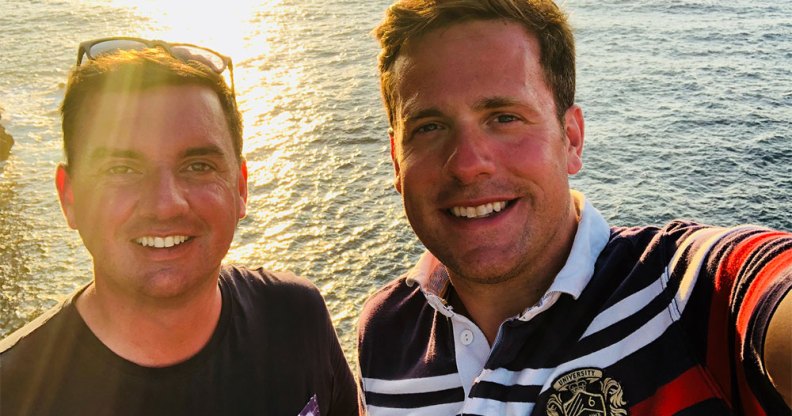Scotland’s first gay couple to have a baby via NHS surrogacy want others to know there is ‘an open door’

Ross and Chris Muller shortly after being accepted for IVF. (Ross Muller)
The first gay couple in Scotland to have a baby via an NHS surrogate want others to know that there is “an open door” for others to follow in their footsteps.
Ross and Chris Muller, who live in Edinburgh, met in 2009 and married in 2017. They always wanted to start a family together and initially looked at adoption before settling on surrogacy.
The couple were shocked when they discovered the enormous cost of private surrogacy — so, they asked the NHS to help make their wish come true, the Daily Record reports.
Ross and Chris said they were originally denied funded surrogacy by the NHS Scotland because they are a male same-sex couple.
The gay couple are the first in Scotland to have a baby through NHS funded surrogacy.
“We had to keep pushing on that door and it was new to the hospital so they hadn’t done this before,” Ross said.
“That’s when they told us that we would be the first in Scotland to go through this.”
A surrogate from Cambridge was found and eight embryos were created from Ross’s friends eggs and his sperm. Finally, an embryo was transferred into the surrogate in November of last year.

The couple’s 12 week baby scan. (Ross Muller)
Just 10 days later, she took a pregnancy test and Facetimed the couple to show them the positive result. Ross and Chris were “over the moon”.
“I think a lot of same-sex couples, male and female, don’t know that this exists, like we didn’t until we found out about it,” Ross said.
“Adoption, as amazing as it is, shouldn’t always be the way that same-sex couples go and the NHS does have an open door because we’ve gone through it.”
They want other couples to know that surrogacy is an option.
Ross added: “A lot has changed since what we went through – the forms don’t say mother and father, they say parent A and B – it’s little things like that. I think it will be a lot easier for people to go down this path if they want to.”
Because the process was funded by the NHS, the couple did not have to pay a penny. They are now expecting a baby boy in August.
They believe they would have paid £45,000 or more if they had opted for private surrogacy.
“The NHS has done everything from start to finish pretty much. We were prepared (to go private) but then we thought, ‘Actually we pay in like everyone else, why wouldn’t we get something out?'” Ross said.

Ross and Chris are now waiting for their baby boy to born in August. (Ross Muller)
Rules on same-sex NHS surrogacy vary across UK.
NHS Scotland previously had a “blanket ban” on funding any treatment that involved the use of a surrogate.
That changed more than two years ago when the Scottish government voted in favour of allowing anybody — regardless of sexuality or gender — to access fertility treatment.
A spokesperson for the Holyrood confirmed last year that surrogacy for male same-sex couples would be funded following the rule change.
Publicly funded surrogacy is significantly more complicated in England, where 200 clinical commissioning groups set their own rules for eligibility. In Northern Ireland, IVF is only offered to women with demonstrated fertility problems.
Meanwhile, the NHS in Wales offers fertility treatment to gay male couples, but has a policy that says: “Surrogacy IVF will only be provided where no other fertility treatment options are available” and only for “medical reasons”.
Aside from funding, would-be parents are also affected by laws which mean the surrogate remains the child’s legal guardian until a parental or adoption order is signed.
While hopeful parents can sign a surrogacy agreement, these are not enforceable by law. Campaigners say that commercial surrogacy combine with enforceable surrogacy agreements would solve this issue, however it is currently against the law in the UK to pay a surrogate anything more than reasonable expenses.

